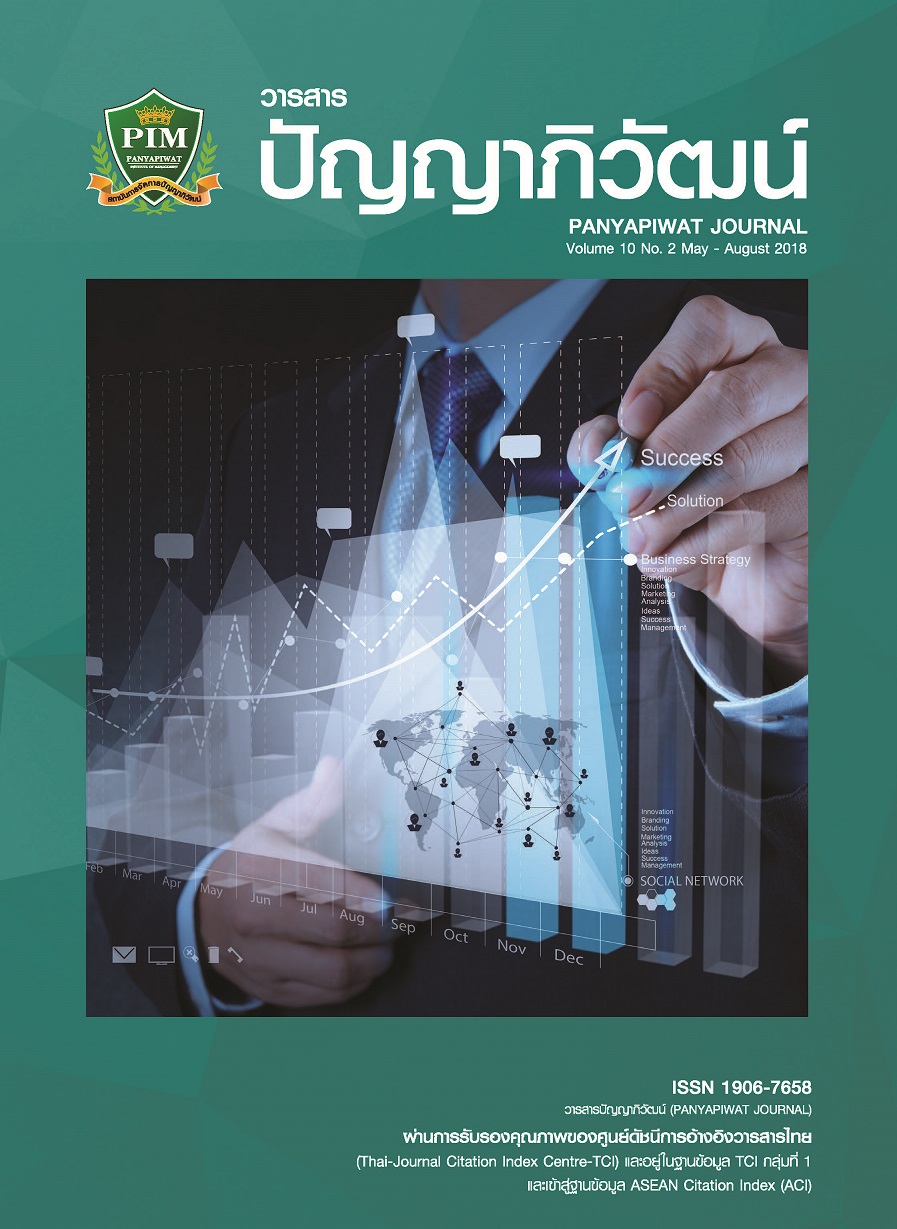การพัฒนารูปแบบการส่งเสริมการศึกษาตลอดชีวิตเพื่อเศรษฐกิจพอเพียง สำหรับชุมชนเกษตรกรรมในเขตพื้นที่สูง
Main Article Content
บทคัดย่อ
การวิจัยครั้งนี้มีวัตถุประสงค์เพื่อศึกษาชุมชนต้นแบบ เพื่อพัฒนา เพื่อศึกษาวิเคราะห์ปัจจัยและเงื่อนไขและเพื่อนำเสนอแนวทางรูปแบบการส่งเสริมการศึกษาตลอดชีวิตเพื่อเศรษฐกิจพอเพียงสำหรับชุมชนเกษตรกรรมในเขตพื้นที่สูง การวิจัยนี้เป็นการวิจัยเชิงคุณภาพประชากร ได้แก่ 25 ชุมชนต้นแบบเกษตรกรรมในเขตพื้นที่สูงที่อยู่ในภาคเหนือ ที่ผ่านเกณฑ์การคัดเลือกของคณะอนุกรรมการขับเคลื่อนเศรษฐกิจพอเพียง กลุ่มตัวอย่าง ได้แก่ ชุมชนเกษตรกรรมในเขตพื้นที่สูง ต้นแบบจำนวน 10 ชุมชน โดยการเลือกแบบเจาะจง เครื่องมือวิจัยประกอบด้วยแบบสัมภาษณ์ แบบสังเกต และแบบบันทึกภาคสนาม การเก็บรวบรวมข้อมูลโดยการลงพื้นที่ชุมชนและสัมภาษณ์ผู้ทรงคุณวุฒิวิเคราะห์ข้อมูลโดยการตรวจสอบแบบสามเส้า (Triangulation) และการสรุปแบบแบบอุปนัย (Inductive Analysis) ผลการวิจัยพบว่า 1. ชุมชนตัวอย่างอยู่บนหุบเขาสูงเดินทางยากลำบาก มีภูมิอากาศที่เหมาะสมต่อการปลูกพืช มีการดำเนินชีวิตที่เรียบง่าย มีความสัมพันธ์ที่ดีต่อกัน มีป่าไม้ในชุมชนที่อุดมสมบูรณ์ มีแม่น้ำสำหรับทำการเกษตรทำให้ชุมชนเข้มแข็ง จุดเด่นของบริบทชุมชนทุกชุมชนมีความคล้ายคลึงกันไม่มีความโดดเด่นเป็นการเฉพาะ 2. รูปแบบการส่งเสริม
การศึกษาตลอดชีวิตประกอบด้วยบริบทของชุมชนกระบวนการที่ส่งเสริมการศึกษาตลอดชีวิต องค์ประกอบของการศึกษาตลอดชีวิต กิจกรรมที่ใช้ในการส่งเสริมการศึกษาตลอดชีวิต วิธีการส่งเสริมการศึกษาตลอดชีวิต ปัจจัยและเงื่อนไขในการส่งเสริมการศึกษาตลอดชีวิต 3. ปัจจัยการนำรูปแบบไปใช้คือ ปัจจัยด้านบุคคล งบประมาณ สื่อ การจัดการการมีส่วนร่วม และจำนวนสมาชิกในชุมชน เงื่อนไขการนำรูปแบบไปใช้คือ การจัดทำแผนงาน แผนชุมชน การสนับสนุนงบประมาณ การให้ทุกส่วนของสังคมตระหนักและเห็นความสำคัญ การประสานความร่วมมือ การมีระบบการจัดการศึกษา 4. แนวทางการส่งเสริมการศึกษาตลอดชีวิตมีดังนี้ การศึกษาทั้งนอกระบบ ในระบบ และตามอัธยาศัย การเรียนรู้ด้วยตนเอง บทบาทของคนในชุมชน พัฒนาแหล่งเรียนรู้ บรรยากาศการเรียนรู้ การพัฒนาหลักสูตรมีกิจกรรมที่หลากหลาย การวิเคราะห์องค์ความรู้ในชุมชน มีหน่วยงานที่รับผิดชอบ การประเมินผล และปรับปรุงสภาพแวดล้อมที่ส่งเสริมการศึกษาตลอดชีวิต
Article Details
“ข้าพเจ้าและผู้เขียนร่วม (ถ้ามี) ขอรับรองว่า บทความที่เสนอมานี้ยังไม่เคยได้รับการตีพิมพ์และไม่ได้อยู่ระหว่างกระบวนการพิจารณาลงตีพิมพ์ในวารสารหรือแหล่งเผยแพร่อื่นใด ข้าพเจ้าและผู้เขียนร่วมยอมรับหลักเกณฑ์การพิจารณาต้นฉบับ ทั้งยินยอมให้กองบรรณาธิการมีสิทธิ์พิจารณาและตรวจแก้ต้นฉบับได้ตามที่เห็นสมควร พร้อมนี้ขอมอบลิขสิทธิ์บทความที่ได้รับการตีพิมพ์ให้แก่สถาบันการจัดการปัญญาภิวัฒน์หากมีการฟ้องร้องเรื่องการละเมิดลิขสิทธิ์เกี่ยวกับภาพ กราฟ ข้อความส่วนใดส่วนหนึ่งและ/หรือข้อคิดเห็นที่ปรากฏในบทความข้าพเจ้าและผู้เขียนร่วมยินยอมรับผิดชอบแต่เพียงฝ่ายเดียว”
เอกสารอ้างอิง
Health Systems Research Institute. (2004). Stop Agriculture Chemical Fertilizer for Thai Health. Bangkok:Seminar documentary of Health Reform for National Health Assembly B.E. 2004. [in Thai]
Highland Research and Development Institute (Public Organization). (2007). HRDI Annual Report 2007. Chiangmai: Institute. [in Thai]
Inhla, S. (2008). Sufficiency Economy-based Lifestyles Leading to Quality of Life of Self-sustained Community Members, Baan Suan Sai Lom Joy, Huay Sai Sub-district, San Kamphaeng District, Chiang Mai Province. Graduate School, Chiangmai University. [in Thai]
Jatuworapluek, T. (1998). The voice of people in borderland: The honour of humanity of Lisu. Chiangmai: Mingmueng printing press. [in Thai]
Kraiwanit, N. (2001). Index for measurement of self-sufficient economy, among the rural communities in Thailand a cause study: communities in the upper North Region. Bangkok: The Thailand research fund. [in Thai]
Ministry of Education. (2010). Action Plan in 4 years (2011-2014). Bangkok: The printing press of the agricultural co-operative federation of Thailand. [in Thai]
Ministry of Education. (2010). Third National Education Act B.E. 2553 (2010). Bangkok: The printing press of express transportation organization of Thailand. [in Thai]
Office of the Basic Education Commission. (2007). The guideline of participation in educational administration. Bangkok: The printing press of the agricultural cooperative federation of Thailand limited. [in Thai]
Office of the Education Council. (2006). Research report: The comparison of development Thai Education with International, The innovation in lifelong learning to improve Thai workforce education. Bangkok: Prikwan Graphic. [in Thai]
Office of the Non-Formal and Informal Education.(2009). Promotion of Non-Formal and Informal Education Act, B.E. 2008. Bangkok: Office of the Non-formal and Informal Education. [in Thai]
Piromsarn, Y. & Ruengkarnjanaset, S. (2009). The basic concepts of life skills. Bangkok: Thai health promotion foundation. [in Thai]
Promjouy, S., Suwanwong, P., Pantawisit, S. & Kongsub, S. (2003). Economy of the Communities in the Lower Northeastern: The Survival of Communities in the Middle of Change. Nontaburi: Sukhothai Thammathirat Open University. [in Thai]
Rakyutidharm, A. (2004). Agricultural and Natural resources. Bangkok: J and J graphic design. [in Thai]
Subcommittee on Sufficiency Economy. (2005). Application of Sufficiency Economy Philosophy (2nd ed.). Bangkok: Part of Sufficiency Economy the Office of the National Economic and Social Development Board. [in Thai]
Sungsri, S. (2003). Research report: Lifelong Education for Thai Society in 21st century.Bangkok: Office of the basic education commission. [in Thai]
Thawornrungkit, W. (2007). Learning Network of Agriculturalists about Supplementary Occupations in Rural Communities. Graduate school, Chiangmai University. [in Thai]
The Office of the National Economic and Social Development Board. (2010). National Economic and Social Development Plan No. 11 (B.E. 2012-2016). Bangkok: Sahamith printing and publishing. [in Thai]
Wasri, P. (2000). Sufficiency Economy and Civil Society: The path of recover Socioeconomic. Bangkok: Morchaoban. [in Thai]
Wongpiromsarn, Y. & Ruangkarnchanaset, S. (2011). Basic concepts of life skills. Bangkok: Teen Health Center Ramathibodi Hospital. [in Thai]


